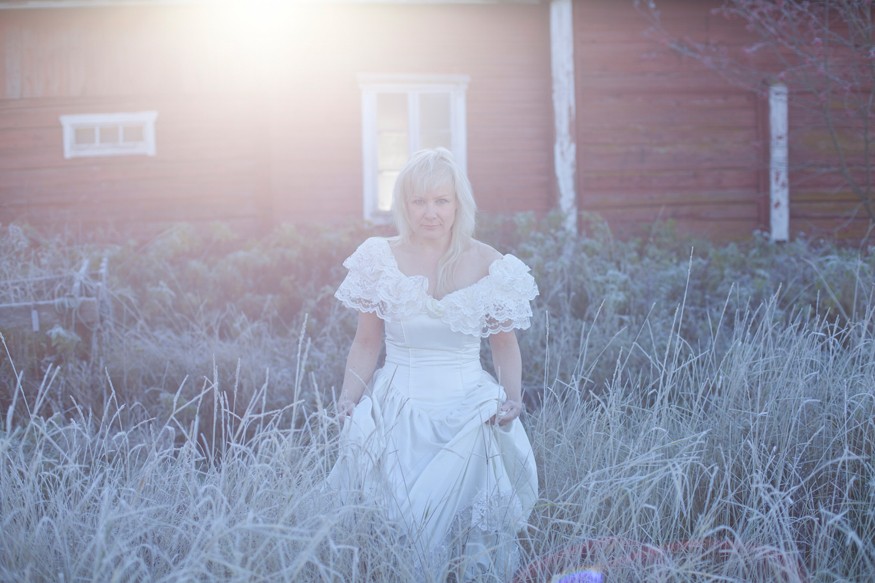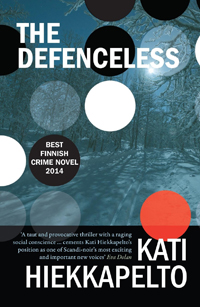
Scandinavian crime fiction carries on booming, but the Finns are settled there just on the edge. As a people, lots of them don’t associate themselves with the rest of Scandinavia (though lots do). In terms of crime fiction, there haven’t really been any breakout superstars from Finland yet – unlike Sweden, Norway, Denmark and Iceland. Kati Hiekkapelto and Antti Tuomainen are changing all of that. Hiekkapelto’s debut The Hummingbird introduced us to the feisty rookie detective Anna Fekete last year, and just recently her second novel, The Defenceless, arrived. She’s a clear talent and has helped raise the flag for the Finns in the world of crime fiction. We decided to ask her more about her books…
Can you tell us about The Defenceless in a nutshell?
The Defenceless is a story of undocumented migration, drugs and gangs. It’s hard to describe the book without revealing too much. I was thinking a lot about home when I wrote it: what makes a place home, where do we most feel at home, and the many people in the world who either don´t have a home or cannot go there. But the most important aspect for me as a crime writer is a good murder story! I hope I’ve succeeded in that. Of course it would be ideal to read The Hummingbird and then The Defenceless, but it’s not compulsory. They are independent stories.

Was it harder or easier to write your second novel?
Both. Easier, because I already had the main characters and knew more about my writing process. For example, I knew that if I get stuck for whatever reason, I just have to wait, think a lot about the text, walk a lot, and the right solution will be found.
Harder, because of greater external pressure. Everybody, including myself, had much higher expectations. I tried not to think about that but only write as well and as honestly as I could. I also have to delve deeper into Anna’s mind and life every time, which is really interesting but not always easy.
Tell us more about Anna and Esko, the police partners and lead characters in the novel?
Anna is a young immigrant woman and Esko is a middle-aged racist man. Both are quite opinionated and hard-working loners. Anna is a very independent woman, she does not miss having a relationship, or at least would never admit it, but she does miss having a real home. She does not feel she belongs to Finland. She has adapted well, speaks perfect Finnish, et cetera, but still feels like an outsider. But she no longer belongs to Yugoslavia either, which in any case is a country that does not exist anymore.
Esko has a severe alcohol problem and associated health problems. He is a misogynist and can be really disgusting. At first he is really nasty to Anna but when he notices how good Anna is at her job and how loyal she is to him, he starts to accept her, to see her as a person not just an immigrant. Little by little these two establish a kind of friendship, although I don’t think Esko will ever change completely.
Why did you decide to address the issue of immigration in your novels?
It is a very sensitive topics everywhere. Hundreds of thousands of people are fleeing their countries and trying to come to Europe, millions are living in refugee camps or suffering in their home countries from poverty, wars and oppression. However, I didn’t consciously choose the topic nor the crime fiction genre. The topic chose me. I have a lot of knowledge about it, both professional and personal, so it was easy to write about. Crime was just a sudden idea. I had always read a lot of crime fiction and thought it would be cool to write a crime novel of my own.

Why do you think Finnish crime fiction hasn’t flourished as much as the crime books from your neighbouring Scandinavian countries?
I think there are many reasons for this. First, other Nordic countries have a longer experience of marketing and producing hits, not just writing, but also music and design. Second, of course, translation. Our language is fundamentally different from the Scandinavian languages, which are related to English, so naturally have more good translators. In Finland we have a lack of good translators. Thirdly, our history is also fundamentally different and that has influenced the writing style too. Finland is still a bit raw and wild, but that makes it fascinating… at least to me.
Why the wedding dress in your author picture?
Haha! It is my old wedding dress and now mostly my alter ego’s outfit. She is called Ginger and she is my bad side. I just realised that it is Ginger who prevents me from reading more in English. I also do ecofeminist performances sometimes in that dress.
Finally, what are you working on now?
The third Anna Fekete novel is coming out in Finland next spring and I still have a lot of work to do on it. My punk band has some gigs in autumn, so we have to practise and write a couple of new songs. I mainly write the lyrics. I’m also planning to write a play at some point, but it’s a long project and I only get a chance to work on it when I have some spare time. which is hardly ever.
For more Scandinavian crime fiction, click here.











Excellent interview. Hiekkapelto and Tuomainen are quite remarkable Finnish crime authors, no doubt about that. As a matter of fact, there might be even some more expectations according to “Nordic Noir” masters – a third Finn, to date still some what less known, but again a really strong runner up.
Watch for the name Max Manner, who writes about a Norwegian cop Stein Storesen based in Turku, Finland.
The last novel in Storesen-series (published in 2015) Jääkyynel, “Tears of ice”, takes place mostly in Lappland and Murmansk, Russia. My bet is Manner might be the real game changer, who’ll finally brakes the ice internationally for the Finns.
Thanks for that tip. We will definitely look out for him. Maybe a publisher with plans to translate is reading this very website?